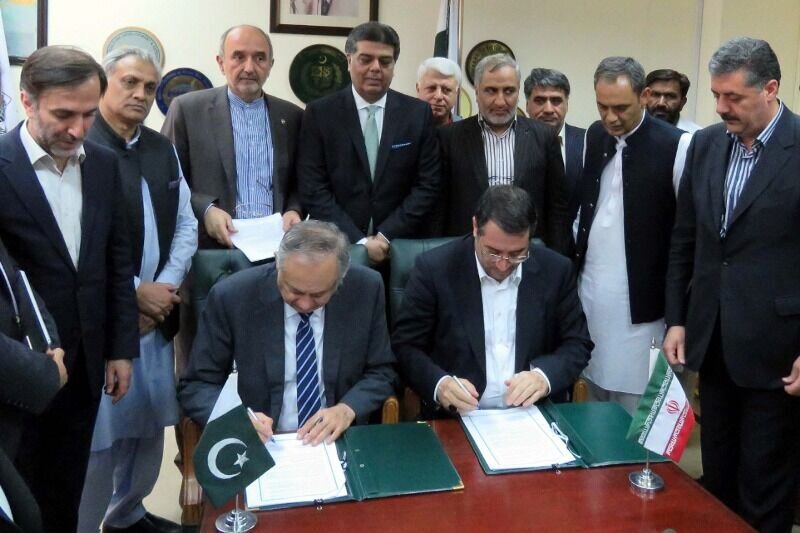Tehran, Islamabad take steps for bolstering bilateral trade

TEHRAN - Heading a high-ranking delegation, Iranian Minister of Industry, Mines and Trade Reza Rahmani paid a visit to Pakistan on Thursday to attend the eighth Iran-Pakistan Joint Trade Committee meeting and to explore avenues of economic cooperation with Pakistani officials.
The two sides signed a memorandum of understanding (MOU) on Friday for strengthening bilateral trade and economic ties and vowed to remove potential barriers in the way of mutual trade, IRNA reported.
The MOU was signed by Reza Rahmani and Pakistan Prime Minister’s Adviser on Commerce, Textile, Industries, Production and Investment Abdul Razak Dawood on the sidelines of the Joint Trade Committee meeting in Islamabad.
The Iranian delegation also held talks with the Pakistani Prime Minister Imran Khan.
Iran proposes special headquarters for facilitating trade
In an interview with IRNA, Rahmani said that during the meeting with Imran Khan, he had proposed establishing a special headquarters to facilitate trade between the two countries.
According to the official, Imran Khan welcomed the expansion of Iran-Pakistan trade ties and said his country was ready to take all necessary measures in this regard.
The minister said that the proposal has also been approved by the Iranian President Hassan Rouhani and the members are going to be selected in near future.
Prime Minister Imran Khan also directed all concerned ministers to take appropriate measures under special working group to strengthen Iran-Pakistan trade ties,” Rahmani added.
The official pointed to some other issues which were discussed in the meeting including tariffs and barter trade, and noted that the two sides have agreed to take necessary steps for removing the potential bottlenecks.
Pakistan keen for boosting trade with Iran
Returning to Iran on Friday night, Rahmani held talks with the officials in Sistan-Baluchestan Province and said Pakistan is eager for expansion of economic ties with Iran.
"The visit was good and satisfactory, and the Pakistani side, expressing interest in the development of trade and economic exchanges, is set to lift the necessary barriers to trade and economic hurdles," he said.
According to the official, activating common border markets and cross-border trade, promoting involvement of the two sides’ private sectors in mutual trade were among the main goals of the Iranian delegation’s visit to Pakistani.
Rahmani further noted that Prime Minister of Pakistan Imran Khan has reaffirmed Pakistan’s commitment to strengthen relations with Iran in diverse fields, including barter trade.
"Facilitating trade, removal of hurdles in economic ties, border issues, and transportation of goods especially foodstuff were among the major issues discussed with the Pakistani side”, he said.
Iran and Pakistan have been taking significant steps for boosting economic relations in the past few years.
In late April, Imran Khan paid a landmark visit to Iran at the top of a political and economic delegation.
An Iran-Pakistan business forum was held in Tehran during the Pakistani prime minister’s visit, in which the two sides emphasized the necessity of using all available opportunities to expand bilateral trade relations.
The business forum, which was held by Tehran Chamber of Commerce, Industries, Mines and Agriculture (TCCIMA) in cooperating with the Embassy of Pakistan in Tehran, was attended by a number of Iranian and Pakistani officials including Imran Khan, Iranian Transport Minister Mohammad Eslami, TCCIMA Head Masoud Khansari, and some businessmen from the both sides.
During Imran Khan’s visit, the two countries issued a joint statement highlighting the two side’s determination to enhance political and economic relations.
In late June, Rahmani also met with Pakistani Ambassador to Tehran Riffat Masood to discuss his visit to Pakistan and follow up on agreements reached during Imran Khan’s visit to Iran.
In the meeting Rahmani offered establishing and activating border markets and identification and resolution of the problems that the two sides’ traders are facing, as some ways of increasing trade between the two countries.
“Considering the two sides’ willingness for achieving constructive business cooperation, it is expected that this goal is going to be achieved in the near future with the measures taken and the greater involvement of the private sector,” he added.
EF/MA
Leave a Comment